How Long Does It Take for Water to Freeze?
Author: Anne Cowart | Editor: Omar Alonso
Review & Research: Jen Worst & Chris Miller
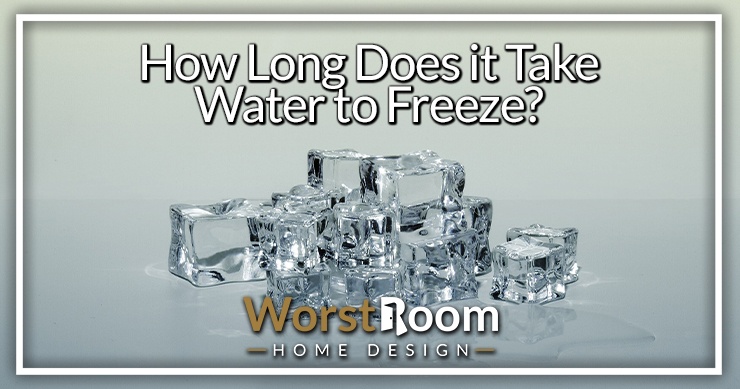
How long does it take for water to freeze? The answer depends on many factors. In this article, we’ll review those aspects, discuss ways you can help it change faster, and go over some specific timeframes for water to freeze.
Water is an incredibly versatile element. It can be in liquid, gas, or solid form. One of the magical transformations is from liquid water to ice. But this can cause problems because this change doesn’t happen immediately.
Things That Impact Water’s Freezing Time
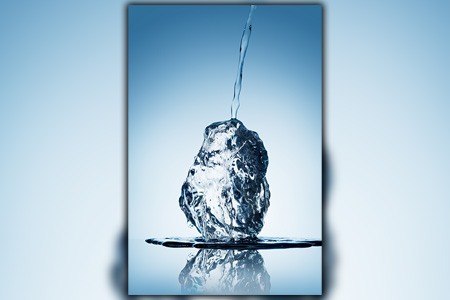
How long does water take to freeze? It depends on many factors. The conditions you place the water to freeze can impact the time it takes.
Without any of the caveats concerning supercooling or other unique conditions, water freezes at the following temperatures (all the same temperature on different scales):
- 32° Fahrenheit
- 0° Celsius
- 273.15 Kelvin
Let’s review some of the major ways that the amount of time for water to freeze can be affected so you can understand what plays a role in the freezing process, and possibly take advantage of it.
Amount of Water
Freezing water is a matter of exchanging heat. It’s easy to understand that adding heat to ice creates water. In physics terms, the inverse is true for forming water. By removing heat from the water, you get ice.
This fact means that the more water you have, the more heat you must remove. As a result, larger volumes of water will take longer to freeze in identical conditions. If you want the water to freeze faster, try limiting the amount you do at once.
Freezer Conditions
Even though you might be unable to tell the difference by sticking your hand inside, freezers can be very different. These seemingly minor differences can impact the time it takes for water to freeze.
Some freezers barely operate below-freezing temperature. If you add an object with excess heat, it might take longer to freeze in this condition. Simply put, the freezer’s power, temperature setting, and other inherent characteristics can change the time to freeze ice.
The things inside your freezer can also change the freezing time. If you block airflow, that hurts the freezer’s abilities. On the other hand, a freezer filled with frozen foods will retain cooler temperatures better than an empty fridge when you open the door. Also, if your freezer door was left open, it will have to cool itself back down in addition to cooling the water as well.
Initial Water Temperature
Another factor that changes the amount of time it takes water to freeze is the starting temperature of the water. As we mentioned, the process of turning water into ice removes heat. You would think that a lower temperature would lower the time.
This is actually a more complicated topic. There is a strange observation known as the Mpemba effect. This contradicts this understanding in a very counterintuitive way. In some cases, slightly warmer water can freeze quicker than cooler water.
Ways To Decrease the Time to Freeze Water
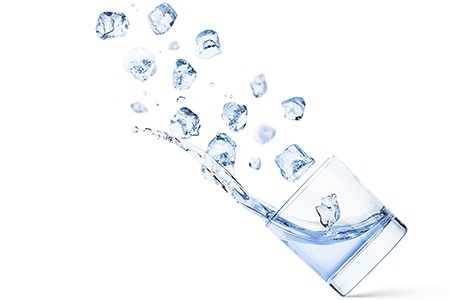
Everyone loves shortcuts when they have the same result. And when it comes to finding out how long it takes for water to freeze, there are some great ways to shorten the time.
While it’s not entirely the same, there is one quick way around this issue. If you need a lot of ice in a hurry, your home freezer might be the wrong choice.
Instead, run to your closest grocery store, gas station, or convenience store. Many of them sell bags of ice at affordable prices. This option can be an excellent solution when time or freezer space is limited.
But if you want to use your freezer, you can make some adjustments. First, it can help to have many frozen items in the freezer. These retain the cold temperature when you open the door and allow the water to freeze more quickly.
Another one of the best possible tips is to freeze water in smaller amounts. By avoiding massive blocks, the cold air can reach more water to transform it into ice. Water hidden deep inside a large container can take surprisingly long to freeze.
Also, you can check to ensure the freezer setting is low. You want the freezer to be well frozen, not right at the edge of freezing temperatures. This setting will help absorb the heat from the water so you can get ice quicker.
How Long Does It Take for Water to Freeze?
Now it’s time to get down to business. Exactly how long does it take for water to freeze?
It would be impossible to cover every freezer condition, temperature, and situation. For this article, we’ll assume you’re working with a standard freezer that is not too packed, blocking airflow. And you don't want it too empty, allowing all the cold air out when you open it.
If we consider that, the primary factor is the amount of water you’re trying to freeze. Let’s review some common volumes of water and household uses of ice.
Into Ice Cubes
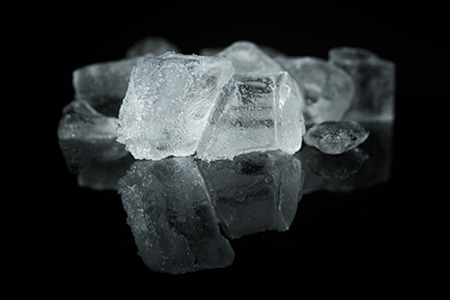
On a hot summer day, there’s nothing better than a cool drink filled with ice. You can transform any drink by adding ice, even a glass of water (but don't put glass in the freezer without confirming it won't break first). But it can also help with complicated cocktails, soft drinks, and many other beverages.
How long does it take for water to freeze into ice cubes? In many cases, it takes one to four hours to freeze an ice tray. This time assumes the ice tray is a standard one. It doesn’t have oversized cubes, and they're spread evenly over a large area.
If you have larger ice cube trays or other unique design elements, it might increase the time for the ice to freeze. So how long for water to freeze in the freezer? To be sure, expect at least 3 hours.
Also, it’s worth knowing that the exterior and top will freeze first. They might look frozen on the surface but still have water underneath. Leaving the water in for a bit longer than you think can help avoid watered-down drinks.
A Gallon of Water
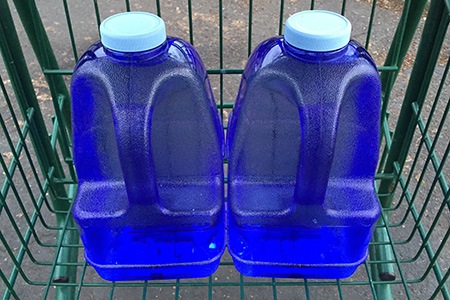
How long does it take to freeze a gallon of water? Sometimes you need a lot more ice than cubes can provide. Perhaps you’re going camping or having an outdoor event and want a block of ice to put in your cooler.
It’s crucial to have patience. In most cases, it takes many hours to freeze a gallon of water all the way through. You can cut this time down by cooling it in the refrigerator before hand, which begs the question of how long it takes a refrigerator to get cold.
While some people with the ideal conditions can see it freeze in about three to four hours, sometimes it can take much longer. To err on the safe side, it’s probably worth leaving the gallon in the freezer for at least five hours or overnight.
By using this approach, you’ll ensure that the water is frozen all the way through. If you take it out earlier, you might be surprised to find an exterior shell of ice with liquid water inside. That can be tough to see before it’s too late.
Large Bodies of Water
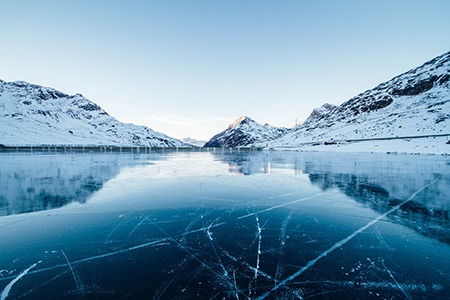
Playing on frozen surfaces can be incredibly fun. But it’s also filled with danger. No one should go on ice unless they know what they’re doing and have complete confidence it is thick enough to support them.
Bodies of water don’t just have the ambient air temperature impacting how quickly the water will freeze. They also have ground heat, possible aquatic life, and movement that affects the freezing process.
In general, bodies of water can take an extremely long time to freeze. Even with air temperatures well below freezing, it’s likely to take many days for a thin layer of ice to freeze over the top.
To get to the point where you can safely walk on it, you’ll need to wait until it freezes a much thicker top layer. This change requires stable conditions. Excessive wind or water currents can prevent the water from freezing thick enough to walk on.
How long does it take for a body of water to freeze? It’s just too hard to say. Instead, plan on many days to get a thin layer of ice. It might take weeks to get a thick layer safe to walk on. And it might never happen.
In a Garden Hose or Sprinkler System
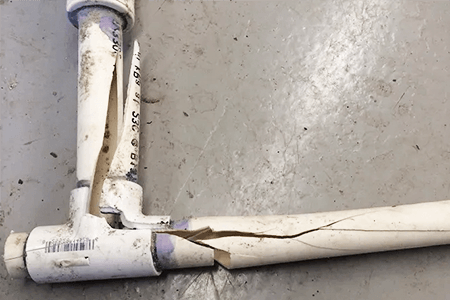
People often forget to winterize their their outdoor water systems, whether that's faucet pipes, sprinkler lines, or a garden hose. You'll always have some remaining water in your garden hose no matter how much you try to spray out.
If you have a winter evening where the temperature dips below 32 °F (0 °C), which is the freezing point of water, in only 4 to 6 hours you could have smaller amounts of water in all these locations becoming expanding, solid ice, which can cause a lot of damage quickly.
Why leave your hose on your garden hose stand when you could disconnect it from the whatever outdoor faucet type you're using and run all of the water out of it? It's costly to replace a perfectly good hose that bursted due to irresponsibility.
That’s How Long it Takes for Water to Freeze
Your freezer’s power, conditions, airflow, and temperature can change the time needed to freeze water. Keep your freezer full and at a cool temperature to speed up the process.
In summary, how long does it take for water to freeze? In many cases, you can freeze a tray of ice cubes for about one to four hours. To freeze a gallon of water, you’ll need around three hours minimum, perhaps significantly longer. For large bodies of water, it can take days or weeks to freeze the surface, or it might not happen at all.




